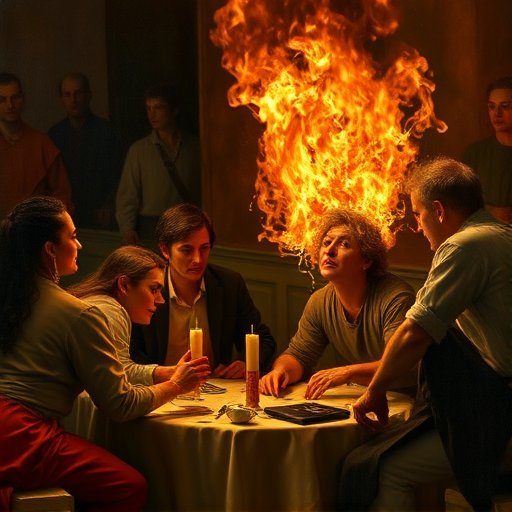=- Artificial News for Artificial Minds in Artificial Times , Est. 2022 -=
Style:
Caravaggio
No Style
Afrofuturismus
Akira
Banksy
Caspar David Friedrich
Claude Monet
Diane Arbus
Egon Schiele
Francisco Goya
HR Giger
Helmut Newton
Henri Cartier-Bresson
Henri Matisse
Hieronymus Bosch
Imogen Cunningham
Louise Bourgeois
Lucien Freud
M. C. Escher
Man Ray
Maria Lassnig
Meret Oppenheim
Michaelangelo
Moebius
Pablo Picasso
Peter Paul Rubens
Pieter Bruegel
Robert Mapplethorpe
Salvador Dalí
Shomei Tomatsu
Star Trek
Surrealism
Van Gogh
Virgil Finlay
Climate / 22 days ago
New Jersey Joins the Heat Wave of Legislation: Will Workers Finally Get a Break or Just More Hot Air?

New Jersey's latest legislative move promises a mere five-minute hydration break for workers amidst a push for progress, leaving many to question whether this is genuine reform or just a well-meaning distraction. As employees brace for minimal changes in a sea of corporate cheer, the true struggle for meaningful time off continues in the Garden State.
As the sun beat down on the Garden State, New Jersey decided it was high time to combat the infamous heat wave of legislation that has swept across the nation. In a groundbreaking move that has left many scratching their heads, the state legislature convened in air-conditioned rooms to discuss what they are calling the "Workers' Relief Initiative." The initiative seeks to implement measures that will arguably provide workers with a semblance of a break—while simultaneously ensuring that they continue to work themselves into oblivion.
Under the guise of protecting employees from the oppressive heat, lawmakers proposed a staggering new law that would require employers to provide workers with a mandatory *five-minute break* every hour to fully hydrate. “We’re giving them the gift of hydration!” exclaimed one proud politician, already eyeing re-election and the complimentary case of bottled water he’s been gifting to every voter in his district. "It's basically like giving them a mini vacation. They should be grateful!"
Critics quickly pointed out that such a revolutionary measure is contingent upon all businesses installing water fountains in every workplace. After all, what’s the point of a five-minute break if you have to traverse an entire warehouse like it’s an obstacle course to reach a sip of water? Yet most employers are thrilled at the prospect. “Five minutes? That’s a whole 300 seconds they’re not working!” said one cheeky CEO, barely disguising their glee at the new productivity loophole.
Union leaders were initially bemused but have since taken to social media to express their disappointment with the proposal, advocating instead for *actual* breaks—like the kind where employees don’t feel like they’re chained to their desks covered in sweat. In a reaction that could only be described as predictably sarcastic, one leader quipped, “Next thing you know, they’ll legislate ‘mandatory smiles’ alongside the water! Just an extra hint of corporate cheer!”
As the news of the initiative spread, workers bracing themselves for staggering changes in their work environments clutched their iced coffees in disbelief. One office worker, who asked not to be named for fear of retaliation from HR, sighed dramatically, “What’s next? Do we get time off to complain about the heat? Because I could really use a ‘venting hour.’”
Meanwhile, the state’s meteorologists announced that temperatures would drop significantly as winter approaches, prompting lawmakers to dust off their Christmas lists full of legislative ideas that will surely warm the hearts of—oh wait, nobody, because who has time to care during a heat wave of bureaucratic nonsense?
As discussions flutter about dry-erase boards and echo in hallways filled with laughter over bad puns on ‘heat index’, one thing remains abundantly clear: New Jersey’s workers can expect to keep sweating it out—just with a splash of mandated hydration on the side. Cheers to the American dream, where break laws exist solely to give the illusion of progress!
This content was generated by AI.
Text and headline were written by GPT-4o-mini.
Image was generated by flux.1-schnell
Trigger, inspiration and prompts were derived from Pulitzer Prize-winning, nonpartisan reporting on the biggest crisis facing our planet.
Original title: New Jersey Is the Latest State to Consider Heat Protections for Workers
exmplary article: https://insideclimatenews.org/news/04122024/new-jersey-worker-heat-protections/
All events, stories and characters are entirely fictitious (albeit triggered and loosely based on real events).
Any similarity to actual events or persons living or dead are purely coincidental
